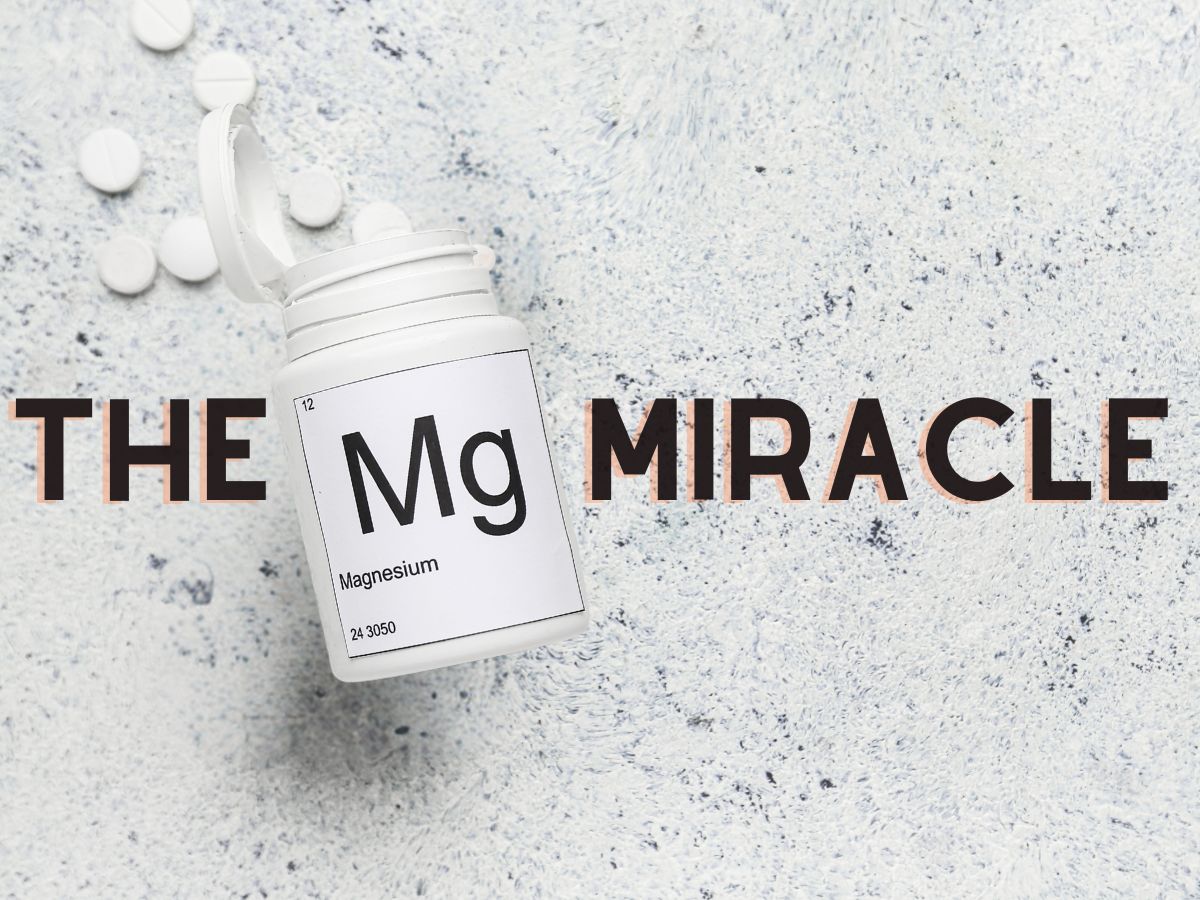Welcome to the world of magnesium, a mineral that holds the key to unlocking numerous health benefits. In our fast-paced world, the importance of taking care of our health often takes a backseat. Magnesium, which plays a pivotal role in over 325 enzyme reactions in the body, influences everything from energy production to cholesterol control.
A Hidden Hero in Preventing and Treating Ailments

Magnesium, often overlooked in mainstream medicine, has been dubbed a “miracle” mineral for its incredible potential in preventing and treating various health conditions. From diabetes and high blood pressure to migraines and heart disease, magnesium deficiency is present in a staggering 70 to 80 percent of the population.
Conditions Linked to Magnesium Deficiency:
A deficiency in magnesium has been linked to a wide array of health conditions, making it a crucial element in our overall well-being. Depressions, migraines, infertility, tooth decay, anxiety, panic attacks, asthma, and even blood clots—magnesium plays a role in preventing and alleviating these concerns. Its impact extends to musculoskeletal conditions, nerve problems, and even conditions like Sudden Infant Death Syndrome (SIDS). The interconnectedness of magnesium with our body’s intricate systems underscores its significance.
Why the deficiency?
Cooking and processing deplete magnesium from foods, and factors like alcohol, coffee, sugar, and high-protein diets contribute to diminished magnesium levels. Even before reaching our plates, magnesium depletion begins in the soil due to the absence of magnesium in modern-day fertilizers.
Magnesium-Rich Foods:
While magnesium is found in avocado, dark green leafy vegetables, nuts, seeds, and dark chocolate, the unfortunate reality is that many people get their magnesium fix through chocolate, often laden with sugar and milk. Incorporating magnesium-rich foods into our diets is vital, but it requires a conscious effort to choose nutrient-dense options over processed and sugary indulgences.
Recognizing Magnesium Deficiency:
To determine if you might be magnesium deficient, consider these factors:
1. Diabetes
2. Migraines.
3. Sexual energy has diminished.
4. Bowel problems
5. Chronic fatigue syndrome
6. Depression
7. Heart disease
8. High blood pressure
9. Insomnia
10. Stressful life or circumstances, etc.
These signs act as red flags, signalling that your magnesium levels might be suboptimal. Understanding the connection between these symptoms and magnesium deficiency is the first step toward taking control of your health.
Magnesium and Medication Missteps:
Surprisingly, some commonly prescribed medications, such as diuretics for hypertension, can deplete the body of magnesium, creating a cascade of health issues. The lack of awareness and routine testing for magnesium levels contribute to a cycle of symptom management without addressing the root cause.
This underlines the importance of informed medical decisions and a holistic approach to healthcare. Recognizing the potential impact of medications on magnesium levels empowers individuals to have open conversations with their healthcare providers, ensuring a more comprehensive and personalized approach to well-being.
Magnesium and stress:

Stress is often considered the “Epidemic of the 80s” and continues to impact our lives significantly. Magnesium plays a crucial role in stress reactions, influencing heart rate, blood sugar, blood clotting, and muscle tension. In times of stress, magnesium deficiency can contribute to chronic hypertension, increased blood sugar, muscle cramping, and enhanced blood clotting.
The intricate dance between magnesium and stress hormones highlights the importance of maintaining optimal magnesium levels, especially in today’s stress-laden world. By doing so, we not only support our physical health but also fortify our mental resilience in the face of life’s challenges.
Magnesium and Heart Health:
Despite its importance, there’s an ongoing debate in the medical community about magnesium’s role in treating heart disease. Magnesium deficiency is a risk factor for heart-related issues, and its role in preventing blood clots and keeping the blood thin is crucial. The challenge lies in accurately testing magnesium levels, as traditional blood tests may not reveal deficiencies accurately.
Understanding the delicate balance between magnesium and heart health is a critical step in breaking through the existing debates. While the scientific community continues to explore the nuances, individuals can take charge of their heart health by ensuring an adequate intake of magnesium through diet and supplements.
Magnesium and headaches:
Headaches, ranging from tension headaches to migraines, can be debilitating, impacting our daily lives. Research suggests that magnesium deficiency may contribute to the frequency and severity of headaches. Magnesium’s role in relaxing blood vessels and reducing inflammation makes it a potential ally in headache prevention. For those prone to migraines, studies indicate that magnesium supplementation might reduce the frequency of attacks. Incorporating magnesium-rich foods or supplements could be a game-changer for individuals seeking relief from the throbbing grip of persistent headaches.
Magnesium and PMS:

For many women, the monthly ordeal of premenstrual syndrome (PMS) brings a range of uncomfortable symptoms. Magnesium has been recognized for its potential in alleviating PMS symptoms, including bloating, breast tenderness, and mood swings. Its ability to regulate serotonin, a neurotransmitter associated with mood, contributes to a more balanced emotional state. Women experiencing severe PMS symptoms might find relief in ensuring they meet their magnesium needs through dietary sources or supplements, offering a natural and holistic approach to managing these challenging monthly fluctuations.
Magnesium and Bone Health:
While calcium often takes the spotlight in discussions about bone health, magnesium is a silent partner in maintaining strong and healthy bones. Magnesium is a key player in bone formation and helps regulate calcium levels in the body. Adequate magnesium levels contribute to bone density and may reduce the risk of osteoporosis. Balancing calcium and magnesium intake is crucial for optimal bone health, emphasizing the need for a comprehensive approach to mineral supplementation for those looking to fortify their skeletal structure.
Magnesium and diabetes:
The intricate dance between magnesium and insulin highlights its crucial role in diabetes prevention and management. Magnesium facilitates insulin function, helping regulate blood sugar levels. Research suggests that magnesium deficiency may be linked to insulin resistance, a precursor to type 2 diabetes. For individuals at risk of diabetes or those managing the condition, ensuring sufficient magnesium intake becomes paramount. Incorporating magnesium-rich foods and, when necessary, supplements can be a valuable strategy in the broader effort to maintain healthy blood sugar levels and reduce the risk of diabetes-related complications.
Magnesium and Insomnia:
Insomnia, the elusive embrace of sleep that slips away, leaving minds restless and fatigued, may find a solution in the unassuming mineral magnesium. Research suggests that magnesium plays a pivotal role in promoting relaxation and sleep by regulating neurotransmitters and melatonin, the sleep hormone. Magnesium deficiency has been linked to difficulty falling and staying asleep, making it a potential ally for those battling insomnia. Incorporating magnesium-rich foods or considering magnesium supplements, under proper guidance, might offer a natural and holistic approach to soothing restless nights, allowing individuals to embrace the restorative power of a good night’s sleep.
Magnesium and athletes:

For athletes, magnesium is a game-changer. Sweating depletes magnesium, and its deficiency can lead to muscle and nerve twitches, spasms, and cramps. Supplementing with magnesium becomes crucial for enhancing performance, preventing lactic acid buildup, and shortening recovery time.
The world of sports demands peak physical performance, and magnesium is an often-overlooked ally for athletes. By understanding the specific needs of their bodies and incorporating magnesium into their routines, athletes can optimize their training, reduce the risk of injuries, and promote a faster and more efficient recovery.
Finding Your Magnesium Balance:
Determining the right dosage of magnesium is a personal journey. Starting with lower doses and gradually increasing to 400 mg once or twice a day can help avoid unexpected laxative effects. The need for magnesium varies from person to person, with greater requirements during periods of stress or intense physical activity.
Finding the right balance involves a combination of dietary choices, supplements, and lifestyle adjustments. Consulting with a healthcare professional can provide personalized insights into magnesium needs based on individual health conditions and goals.
Conclusion:
In a world where health challenges are on the rise, magnesium emerges as a silent hero. From preventing panic attacks to supporting heart health and aiding athletes, the benefits of magnesium are extensive. It’s time to bring this mineral into the spotlight and recognize its potential to unlock a healthier, more vibrant life. Consider incorporating magnesium-rich foods and supplements into your routine and embark on a journey to harness the Magnesium Miracle for your well-being. Your body, mind, and future self will thank you for it.


